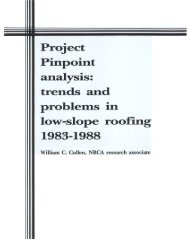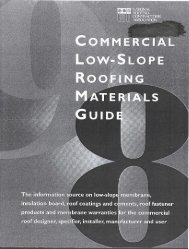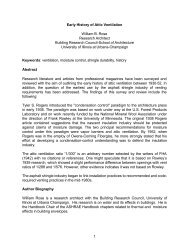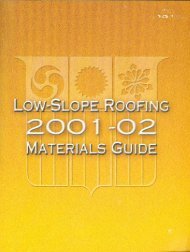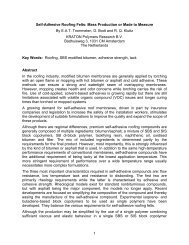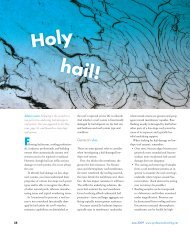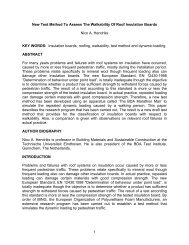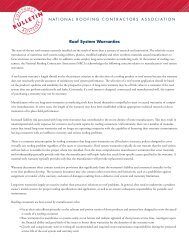Untitled - National Roofing Contractors Association
Untitled - National Roofing Contractors Association
Untitled - National Roofing Contractors Association
You also want an ePaper? Increase the reach of your titles
YUMPU automatically turns print PDFs into web optimized ePapers that Google loves.
. Equiviscous Temperature (EVT). The recommended<br />
temperature for the application of roofing<br />
bitumens at the mop bucket or felt layer immediately<br />
prior to application to the substrate.<br />
. Asphalt Products. The recommended Equiviscous<br />
Temperature (EVT) range for roofing asphalt<br />
(ASTM 0-312, Type I, II, III, and IV) is the temperature<br />
at which a viscosity of 75 centipoise is<br />
attained, plus or minus 25 F.<br />
. Coal Tar Products. The recommended Equiviscous<br />
Temperature (EVT) range for coal tar<br />
products (ASTM D-450, Type I and III) is the temperature<br />
at which a viscosity of 25 centipoise is<br />
attained, plus or minus 25 F.<br />
NRCA strongly recommends that the following information<br />
be printed on each carton, package and bill of lading<br />
for both asphalt and coal tar products:<br />
. Product Type. The type of product by ASTM<br />
designation, e.g., ASTM D-312, Type III, ASTM<br />
0-450, Types I and III.<br />
. Flash Point. The flash point as determined by<br />
ASTM Standard D-92, Flash and Fire Point by<br />
Cleveland Open Cup.<br />
. Equiviscous Temperature (EVT) of Asphalt.<br />
The temperature at which the asphalt attains a<br />
viscosity of 75 centipoise as determined by ASTM<br />
Method 0-4402, Viscosity Determinations of Unfilled<br />
Asphalt Using the Brookfield Thermosel<br />
Apparatus.<br />
. Equiviscous Temperature (EVT) of Coal Tar.<br />
The temperature at which the coal tar product attains<br />
a viscosity of 25 centipoise when determined<br />
by ASTM Method 0-4402, Viscosity Determinations<br />
of Unfilled Asphalt Using the Brookfield<br />
Thermosel Apparatus.<br />
ty of the product. Further, excessive heating may present<br />
a serious flash or fire hazard to property and personnel.<br />
In light of these parameters, NRCA makes the following<br />
recommendations:<br />
. DO maintain kettle and tanker temperature less<br />
than 25 F below the actual flash point of the<br />
material used.<br />
. NEVER heat materials to or above the actual<br />
flash point.<br />
. DO NOT maintain materials at high temperatures<br />
for prolonged periods of time.<br />
. DO NOT allow materials to stand in luggers for<br />
long periods.<br />
. DO insulate hot transport lines.<br />
. DO circulate materials.<br />
One consequence of a change in EVT from 125 centistokes<br />
to 75 centipoise, plus or minus 25 F., is the potential<br />
need to increase the temperature at which the bitumen<br />
is heated in the kettle or tanker. NRCA encourages<br />
manufacturers to furnish bitumens with a sufficiently high<br />
flash point such that contractors can heat the material<br />
to temperatures sufficient to apply material in the EVT<br />
range, particularly in cold weather applications, without<br />
maintaining the material above 25 F. below the actual<br />
flash point.<br />
In the event EVT information is not furnished by the<br />
manufacturer, the following maximum heating temperatures<br />
for asphalt should be used as guidelines.<br />
Recommendations:<br />
Excessive and prolonged heating of asphaltic and coal<br />
tar products may have a deleterious effect on the quali-<br />
34<br />
35



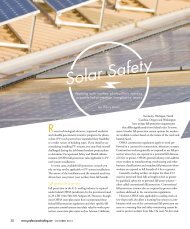
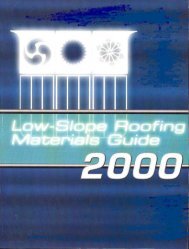
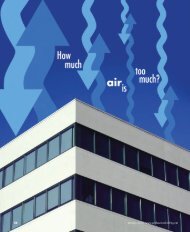

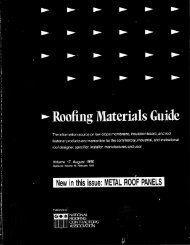
![Wm] - National Roofing Contractors Association](https://img.yumpu.com/36696816/1/190x245/wm-national-roofing-contractors-association.jpg?quality=85)
